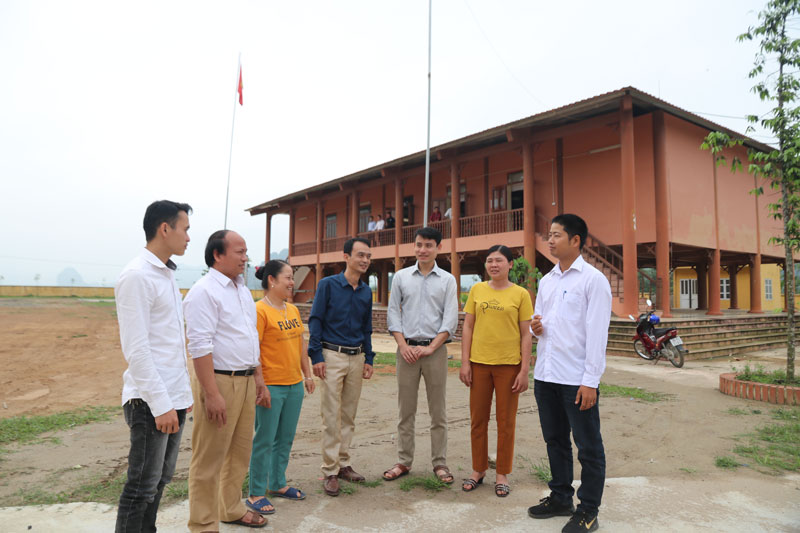
(HBO) - Underprivileged areas in Kim Boi district has been getting a gradual facelift thanks to State investments in ethnic minority-inhabited regions.
In communes and
villages which benefit from Programme 135, transport and irrigation facilities,
schools, community houses and other items have been constructed, and proved
effective, thus stepping up the transfer of the economic structure of the
locality.
In the last 5 years,
thanks to investments from Programme 135, the district has had more than 30 km
of roads built or repaired. It has also built, repaired or upgraded 73 works to
ensure irrigation for nearly 1,000 hectares of rice, and built many rooms for
preschools, primary schools, and secondary schools, and cultural houses with a
total investment of nearly 97 billion VND.
 Thanks to investment for ethnic minority-inhabited
areas, Hop Kim commune’s cultural house was built as a community place for
local people.
Thanks to investment for ethnic minority-inhabited
areas, Hop Kim commune’s cultural house was built as a community place for
local people.
Works serving common
interests of communes and villages, which are managed by the commune People's
Committee, can use the programme’s fund for maintenance work. During 2014 -
2019, Kim Boi District People's Committee has received over 5.3 billion VND to
maintain 263 projects of all types.
Many investment
projects are valued at tens of billions of VND, including machines for
production such as plowing machines, water pumps, pesticide spraying machines,
electricity generators, animal feed machines; and funds to buy buffaloes and
cows.
The projects supporting
production development under the National Target Programme for Sustainable
Poverty Reduction have contributed to economic restructuring towards commodity
production and building agricultural, forestry and fishery production models, thus
helping raise locals’ incomes and reduce poverty.
According to Nguyen
Thanh Trung, head of the Ethnicity Division of Kim Boi district, thanks to
investments in infrastructure, the Kim Boi is getting a facelift, especially in
electrical, road, school and medical stations, and the material and spiritual
lives of locals have been significantly improved, which reinforces the trust in
the leadership of the Party and State among ethnic minority people in the
locality./.
More than just an information technology teacher, Bui Van Nien is an inspiring figure who has nurtured the scientific curiosity and creative spirit of students in Vietnam’s ethnic minority communities.
Da Bac is the most disadvantaged mountainous district in Hoa Binh province, with ethnic minorities accounting for about 90% of its population. Over the past years, the district has mobilised resources to implement ethnic policies to improve the quality of life of local people.
In recent years, Hoa Binh province has consistently prioritised the protection, care, and education of children, particularly those from ethnic minorities and disadvantaged backgrounds, by creating a safe, healthy, and nurturing environment for their all-round development.
The Steering Committee for Tobacco Harm Prevention and Control of Hoa Binh province, in coordination with the Tobacco Harm Prevention and Control Fund, held a ceremony on May 28 in response to the World No Tobacco Day (May 31) and the National No Tobacco Week (from May 25 to 31). The event was chaired by Nguyen Van Toan, Standing Vice Chairman of the provincial People’s Committee and head of the Steering Committee.
Since 2021, the Center for Industrial Promotion and Industrial Development Consulting (CIIDC) under the Department of Industry and Trade has been implementing a school lighting model as part of the plan for using energy efficiently and economically in Hoa Binh Province in the pẻiod of 2021 - 2025. This model not only aims to improve the learning conditions and enhance the education quality, but it also promotes the message of energy saving, energy security, environmental protection and contributes to the goals of socio-economic development.
In the 2024 - 2025 school year, the entire Hoa Binh provincial education sector includes 520 educational institutions and schools. Among them are 13 ethnic boarding schools with 153 classes and 4,487 students. Four of these schools have met national standards, reaching 30.7 percent.



 Thanks to investment for ethnic minority-inhabited
areas, Hop Kim commune’s cultural house was built as a community place for
local people.
Thanks to investment for ethnic minority-inhabited
areas, Hop Kim commune’s cultural house was built as a community place for
local people.